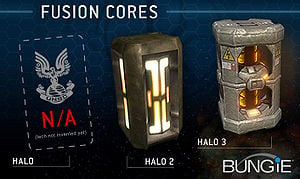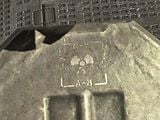Fusion coil: Difference between revisions
From Halopedia, the Halo wiki
(→Trivia) |
|||
| Line 6: | Line 6: | ||
==Operation== | ==Operation== | ||
The Fusion Coil is the "safest, most intelligent way to transport and store highly explosive compressed plasma energy".<ref name="bwu-12345"/> The containers | The Fusion Coil is the "safest, most intelligent way to transport and store highly explosive compressed plasma energy".<ref name="bwu-12345"/> The containers are made primarily out of glass and aluminum.<ref name="bwu-12345"/> There is high voltage and radioactivity present in a Fusion Coil.<ref>Indicated by a texture present on ''Halo 3''-era Fusion Coils.</ref> Formerly, there was speculation that the actual core was a highly volatile radioactive power source for UNSC ground operations, although this has been denied by Bungie. | ||
The Fusion Core may be related to the also UNSC [[Deuterium Fusion Core]], although this hasn't been confirmed. It is also similar to the [[Covenant Empire|Covenant]] [[Plasma Battery]], but can be detonated with fewer shots. | The Fusion Core may be related to the also UNSC [[Deuterium Fusion Core]], although this hasn't been confirmed. It is also similar to the [[Covenant Empire|Covenant]] [[Plasma Battery]], but can be detonated with fewer shots. | ||
Revision as of 15:32, February 25, 2010

The Fusion Core, which is more formally known as the Fusion Coil, is a United Nations Space Command ground container for compressed plasma.[1] The containers are made primarily out of glass and aluminum.[1]
Operation
The Fusion Coil is the "safest, most intelligent way to transport and store highly explosive compressed plasma energy".[1] The containers are made primarily out of glass and aluminum.[1] There is high voltage and radioactivity present in a Fusion Coil.[2] Formerly, there was speculation that the actual core was a highly volatile radioactive power source for UNSC ground operations, although this has been denied by Bungie.
The Fusion Core may be related to the also UNSC Deuterium Fusion Core, although this hasn't been confirmed. It is also similar to the Covenant Plasma Battery, but can be detonated with fewer shots.
Aesthetics
Halo 2
Halo 2 era Fusion Cores are explosive objects matte brown in color and rectangular in shape, overlaid with what appears to be austere gold circuitry on the surface.
Halo 3
In Halo 3, the Fusion Coil has been graphically redesigned. The actual plasma core appears to be an amber, darkly-glowing, cylindrical object within a metallic-gray colored frame. When slightly damaged, the internal core glows a warning red; when heavily damaged, it glows bright white. Stickers on the frame warn of radioactivity and high voltage. It emits a loud humming noise constantly.
Pyrotechnics
Several shots from any weapon can detonate these volatile cores. The explosion is a bloom of yellow and red superheated gas and sparks.
In multiplayer, players often may attempt to lay an ambush for a hostile near a core by tossing a Fragmentation Grenade towards the core when the enemy forays near. Alternatively, they can be pushed from above onto passing enemies, exploding on impact with the ground, or used as anti-vehicle landmines at vehicle choke points. They have also been used for Explosive Jumping and in Forge to create perpetual explosions.
Appearances
Halo 2
Fusion Cores can be found on six Halo 2 multiplayer maps: Foundation, Headlong, Ivory Tower, Tombstone , Zanzibar and Waterworks. They are not seen in the campaign.
Halo 3
Fusion Coils were first spotted in the Halo 3 Beta, in the multiplayer maps High Ground and Valhalla. They appear in several other multiplayer maps as well as in the Campaign levels Crow's Nest, The Storm and Floodgate.
Fusion Coils feature prominently in Forge, where players can place a large amount of cores on any location in a map and detonate them. A Bungie Weekly Update described an incident where a beta tester used them, along with the Instant Respawn trick, to turn an Elephant into a "satanic piñata" on Sandtrap.[3]
Tactics
Some people don't think much about using these cores as an effective strategy. However these cores are pretty good trap items on Forge. If you see a player near one, shoot the core. It'll weaken the player or kill him, depending on the number of coils nearby. Note: If the cores are near you too, be careful. Blowing one up will blow up others, causing a chain reaction. If encountered in Campaign, stick to Multiplayer tactics for there's not much difference.
Trivia
- A trap can be made by shooting one with a Shotgun at a certain distance, causing it it fall over and glow white before having a very delayed detonation; which also be triggered by touching the glowing container.
- Fusion Coils can be used in Forge to flip Elephants and create perpetual explosions.
- Fusion Coils had not yet been invented during the events of Halo: Combat Evolved.
- When saving a map variant in Forge, brief a Terms of Use agreement is shown. In the agreement, Bungie jokingly references the temptation to exploit these items, adding: "...And try not to build all your structures out of Fusion Coils."
- In the Halo 3 Manual, under "The Forge - Co-op" It references "Cooperate with your friends to make the work go faster, But don't forget to throw a fusion coil at them from time to time."
Gallery
- 1221789209 Fusion 2.jpg
Fusion Cores from Halo 2.
Pictures of fusion cores in Halo 3. The left is normal, the middle is slightly damaged, and the right is exploding.
- Boom Goes the 'Hog copy.jpg
A Halo 3-era Warthog on top of a massive pile of fusion cores, awaiting its flight commonly known as the "Warthog Jump".
Sources
- ^ a b c d Bungie Weekly Update 04/06/2007
- ^ Indicated by a texture present on Halo 3-era Fusion Coils.
- ^ Bungie Weekly Update 08/03/2007

